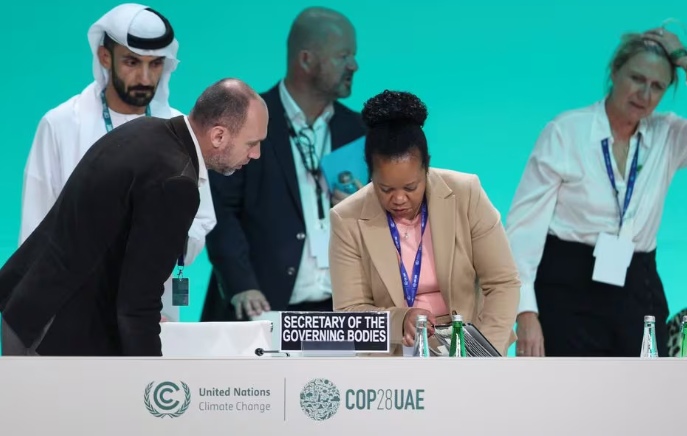The COP28 climate talks in Dubai have culminated in a historic agreement that will see the world phase out all fossil fuels for the first time.
The president of this year’s UN-organised summit, Sultan Al Jaber of the UAE, brokered an agreement that was strong enough for the US and the EU on the need to sharply curb the use of fossil fuels while keeping Saudi Arabia and other oil producers on board.
The final agreement calls for countries to phase out fossil fuels from their energy systems in a swift and orderly fashion, which helped convince sceptics. The agreement also calls for countries to contribute to the global transition effort – rather than explicitly forcing the transition on their own.
The so-called “UAE Consensus” ends the hottest year on record, which led to droughts and devastating wildfires. Al Jaber, who’s also chief executive officer of Abu Dhabi National Oil Co, noted:
“Together we have confronted the realities and sent the world in the right direction.”
While the outcome falls short of the concrete “divestment” from fossil fuels that most countries wanted, it offers a new opportunity: No previous COP document has talked about divestment from oil and gas, fuels that have underpinned the world economy for decades.
How quickly this becomes a reality will be decided not by the diplomatic backroom battles that led to today’s deal, but by investors, consumers and national governments. Since the pledge to phase out coal two years ago in Glasgow, its consumption continues to rise and the world is unlikely to be able to limit warming to the 1.5 C envisaged in the Paris Agreement.
Nevertheless, the Dubai decision is an important marker in the global direction of travel towards a low-carbon energy system. The text of the agreement also includes arrangements to triple the deployment of renewable energy and double the rate of efficiency improvements by the end of the decade. A separate COP28 agreement reached at the start of the summit operationalises a hard-won fund to address loss and damage from climate change. Al Jaber said:
“An agreement is only as good as its implementation. We are what we do, not what we say. We must take the steps necessary to turn this agreement into tangible actions.”
The COP28 language calling for a reduction in the use of fossil fuels will signal to investors the future of energy markets, said Jennifer Morgan, Germany’s climate envoy, at the end of a plenary session at Dubai Expo City. She added:
“We now tomorrow move forward in implementing this. Every investor should understand now that the future investments that are profitable and long-term are renewable energy — and investing in fossil fuels is a stranded asset.”
The last-minute deal is a diplomatic victory for the UAE and Al Jaber, whose role at Adnoc made him a controversial choice to lead this year’s negotiations. There were hiccups – accusations that he used his role to lobby for oil deals and a dispute over the science of climate change – but in the end he will claim he got his way.
Al Jaber used his presidency to bring the oil and gas industry into the COP process, and the summit was attended by more representatives of fossil fuel companies than any previous summit, prompting criticism from climate activists.
He brokered a pact between more than 50 companies to reduce emissions from their own operations. It says nothing about the level of oil and gas production, but a pledge to cut methane pollution – 80 times more dangerous than carbon dioxide – to almost zero by the end of the decade could have a significant impact on emissions.
